2023年冀教版中考英语二轮复习 第二章 语法精讲 第四课时 形容词和副词课件(共40张PPT)
文档属性
| 名称 | 2023年冀教版中考英语二轮复习 第二章 语法精讲 第四课时 形容词和副词课件(共40张PPT) |

|
|
| 格式 | pptx | ||
| 文件大小 | 446.3KB | ||
| 资源类型 | 教案 | ||
| 版本资源 | 冀教版 | ||
| 科目 | 英语 | ||
| 更新时间 | 2023-05-23 00:00:00 | ||
图片预览


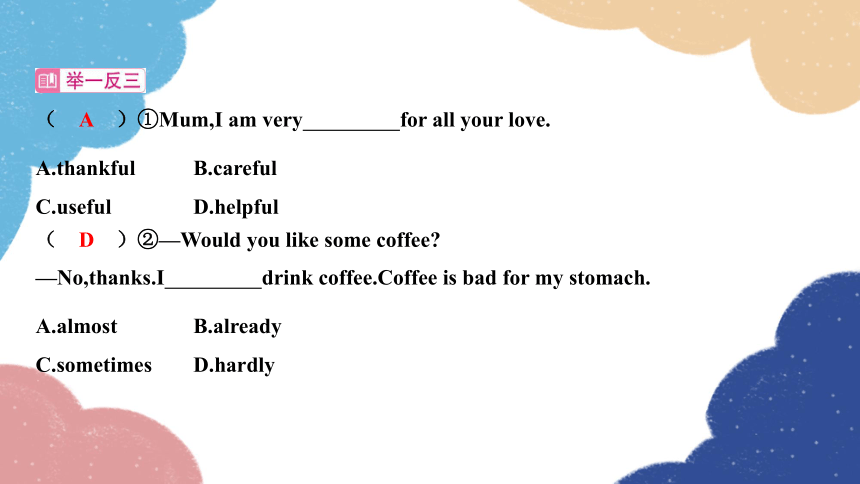
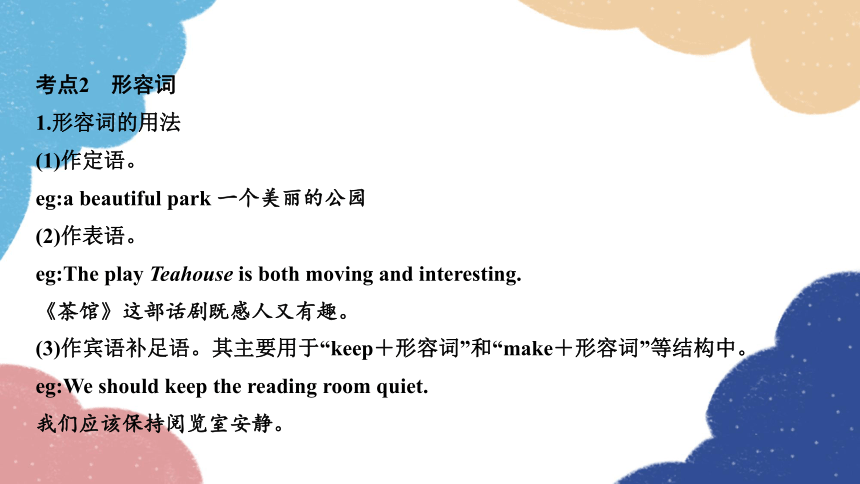
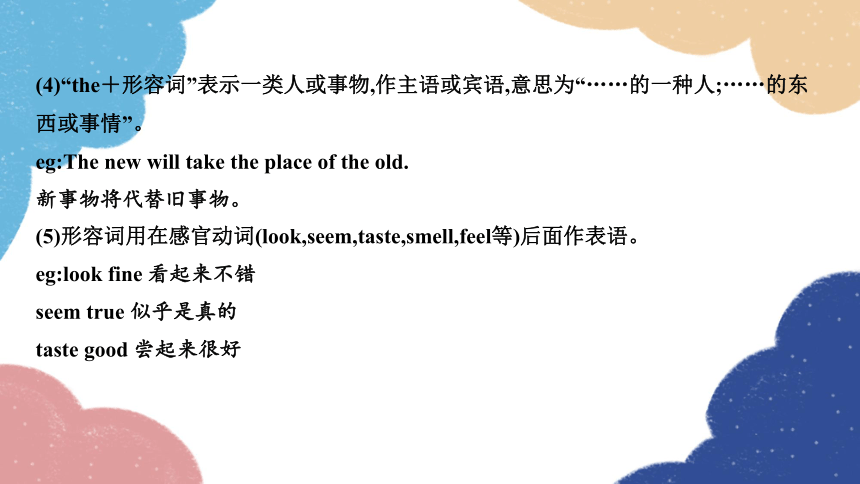
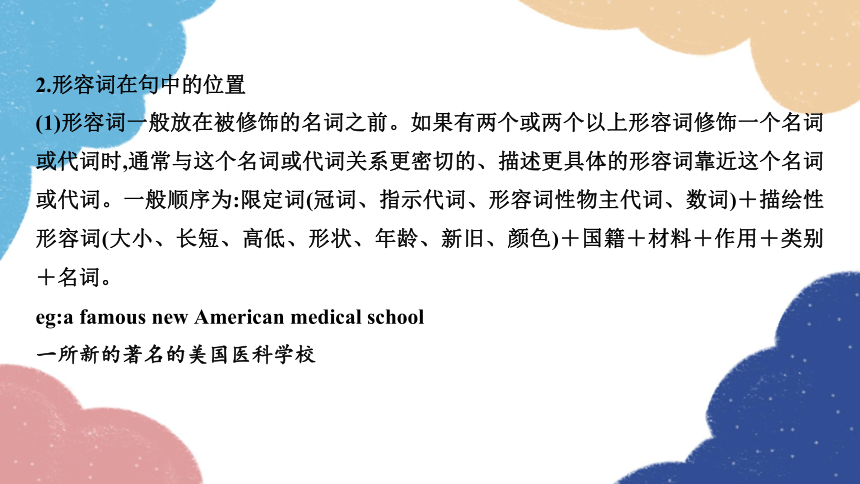
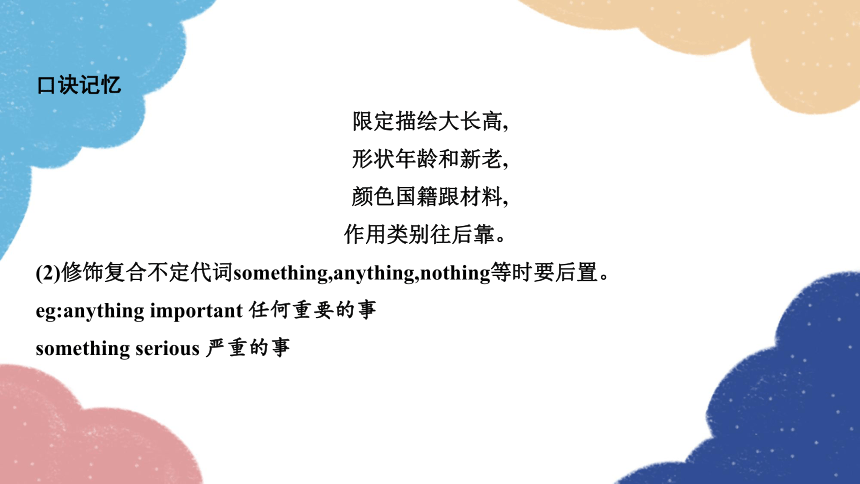
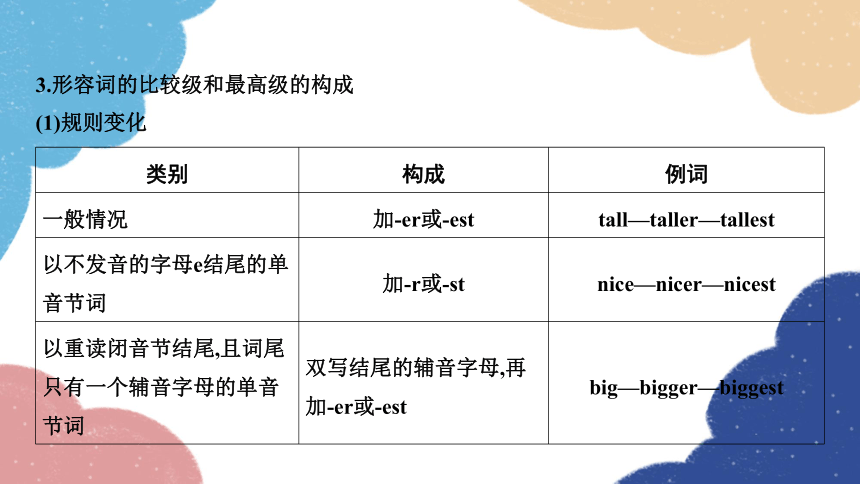
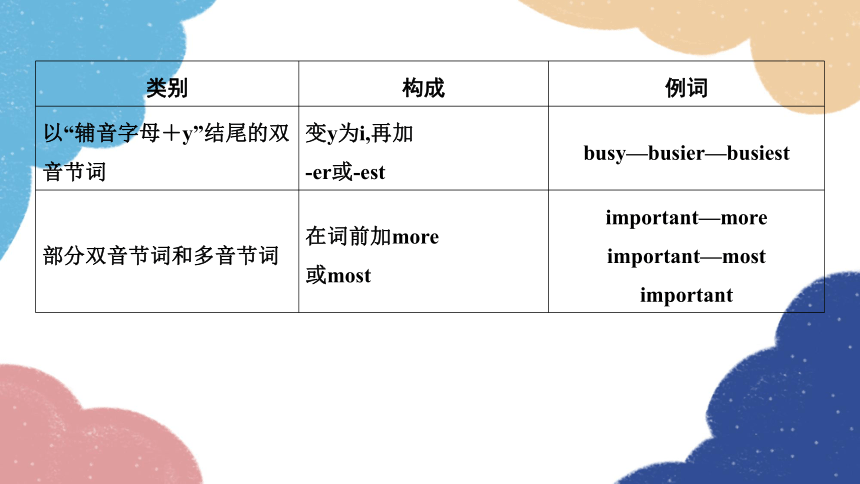
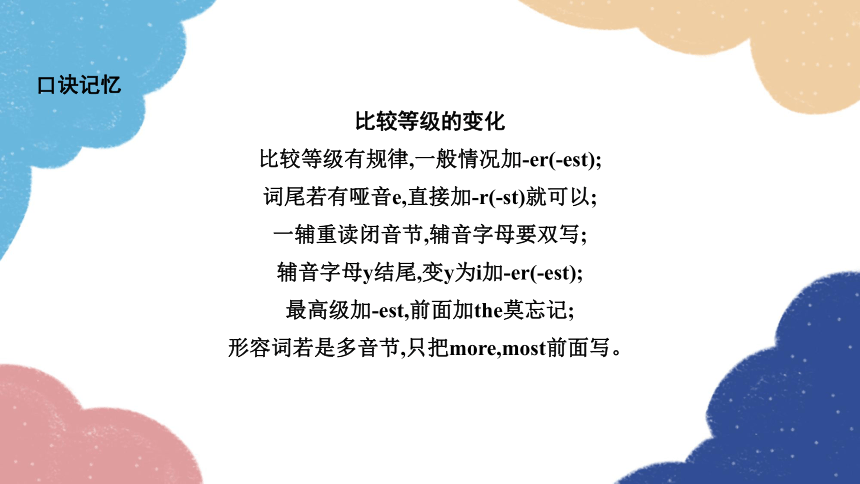

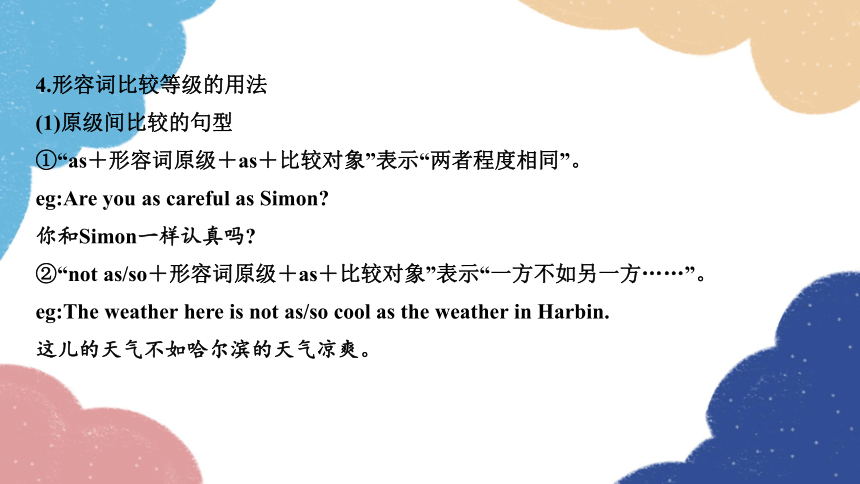
文档简介
(共40张PPT)
第四课时 形容词和副词
第二章 语法精讲
考点分类
考点1 形容词和副词的定义
形容词(adj.)用来修饰名词或代词,表示人或事物的性质、状态或特征。副词(adv.)用来修饰动词、形容词或其他副词等,说明时间、地点、程度、方式等概念。
eg:tall高的 busy忙的
narrow窄的 quickly快地
usually通常
( A )①Mum,I am very for all your love.
A.thankful B.careful
C.useful D.helpful
( D )②—Would you like some coffee
—No,thanks.I drink coffee.Coffee is bad for my stomach.
A.almost B.already
C.sometimes D.hardly
A
D
考点2 形容词
1.形容词的用法
(1)作定语。
eg:a beautiful park 一个美丽的公园
(2)作表语。
eg:The play Teahouse is both moving and interesting.
《茶馆》这部话剧既感人又有趣。
(3)作宾语补足语。其主要用于“keep+形容词”和“make+形容词”等结构中。
eg:We should keep the reading room quiet.
我们应该保持阅览室安静。
(4)“the+形容词”表示一类人或事物,作主语或宾语,意思为“……的一种人;……的东西或事情”。
eg:The new will take the place of the old.
新事物将代替旧事物。
(5)形容词用在感官动词(look,seem,taste,smell,feel等)后面作表语。
eg:look fine 看起来不错
seem true 似乎是真的
taste good 尝起来很好
2.形容词在句中的位置
(1)形容词一般放在被修饰的名词之前。如果有两个或两个以上形容词修饰一个名词或代词时,通常与这个名词或代词关系更密切的、描述更具体的形容词靠近这个名词或代词。一般顺序为:限定词(冠词、指示代词、形容词性物主代词、数词)+描绘性形容词(大小、长短、高低、形状、年龄、新旧、颜色)+国籍+材料+作用+类别+名词。
eg:a famous new American medical school
一所新的著名的美国医科学校
口诀记忆
限定描绘大长高,
形状年龄和新老,
颜色国籍跟材料,
作用类别往后靠。
(2)修饰复合不定代词something,anything,nothing等时要后置。
eg:anything important 任何重要的事
something serious 严重的事
3.形容词的比较级和最高级的构成
(1)规则变化
类别 构成 例词
一般情况 加-er或-est tall—taller—tallest
以不发音的字母e结尾的单音节词 加-r或-st nice—nicer—nicest
以重读闭音节结尾,且词尾只有一个辅音字母的单音节词 双写结尾的辅音字母,再加-er或-est big—bigger—biggest
类别 构成 例词
以“辅音字母+y”结尾的双音节词 变y为i,再加 -er或-est busy—busier—busiest
部分双音节词和多音节词 在词前加more 或most important—more
important—most
important
口诀记忆
比较等级的变化
比较等级有规律,一般情况加-er(-est);
词尾若有哑音e,直接加-r(-st)就可以;
一辅重读闭音节,辅音字母要双写;
辅音字母y结尾,变y为i加-er(-est);
最高级加-est,前面加the莫忘记;
形容词若是多音节,只把more,most前面写。
(2)不规则变化
原级 比较级 最高级
good/well better best
little less least
bad/ill worse worst
much/many more most
far farther/further farthest/furthest
少数单音节词,如pleased,glad,fond等,也可以在其前面加more,most构成比较级和最高级。
4.形容词比较等级的用法
(1)原级间比较的句型
①“as+形容词原级+as+比较对象”表示“两者程度相同”。
eg:Are you as careful as Simon
你和Simon一样认真吗
②“not as/so+形容词原级+as+比较对象”表示“一方不如另一方……”。
eg:The weather here is not as/so cool as the weather in Harbin.
这儿的天气不如哈尔滨的天气凉爽。
(2)比较级和最高级的句型
①“比较级+than+比较对象”表示“一方比另一方更……”。
eg:He is taller than me.他比我高。
②“the+形容词比较级+of the two”表示“两者之间较……的一个”。
eg:He is the stronger of the two.
他是这两个人中较壮的一个。
③“比较级+and+比较级”表示“越来越……”。
eg:The story gets more and more exciting.
故事越来越精彩了。
④“the+比较级,the+比较级”表示“越……越……”。
eg:The more,the better.越多越好。
⑤“Which/Who+系动词+比较级,A or B ”表示“两者之间进行选择,哪一个更……”。
eg:Which one is more popular,the radio or the movie
广播和电影哪一个更受欢迎
⑥“倍数+比较级+than”表示“几倍于……”。
eg:My dog is three times heavier than my cat.我的狗比猫重三倍。
⑦当表示在三个或三个以上的人或事物中程度哪一个最高时,用“the+最高级(+可数名词单数)+in/of/among短语”。
eg:He is the strongest of all.
在所有人中,他是最壮的。
⑧“Which/Who...+最高级,A,B or C ”表示“三者之中哪一个最……”。
eg:Who is the tallest,Tom,Jack or Jim
Tom,Jack和Jim中谁是最高的
⑨“one of the+形容词最高级+可数名词复数+范围”意为“最……之一”。
eg:He is one of the best basketball players in our school.他是我们学校最出色的篮球运动员之一。
⑩“the+序数词+最高级+范围”意为“第几最……”。
eg:Mike is the second tallest boy in his class.Mike是他班里第二高的男生。
(3)使用形容词比较等级时应注意的问题
①形容词比较级前可加much,even,still,a lot,far,a bit,a little,any等表示程度的副词。
eg:Your English is much better than mine.
你的英语比我好很多。
②有时形容词比较级后面不用than,所比较的另一方省略。
eg:Be more careful next time.
下次再认真一点儿。
③elder与eldest仅表示“家庭成员中年长的人”,用于同辈之间;older与oldest则表示“旧;年老”。
eg:My elder sister left for New York last month.我姐姐上个月去纽约了。
Mr.Li is the oldest comrade in our office.
李先生是我们办公室中最年长的同事。
( B )①—How are you getting on with your lessons
—Much .I can do well in the final exam.
A.good B.better C.best D.well
( A )②The weather is becoming .
A.hotter and hotter
B.more hot and hot
C.hoter and hoter
D.more and more hot
B
A
( A )③It’s every policeman’s dream to keep people and the traffic in good order.
A.safe B.healthy C.busy D.famous
( C )④He often drinks two cups of water when he comes back.
A.boiling B.boil C.boiled D.boils
A
C
考点3 副词
1.副词在句子中的作用
副词在句子中主要用作状语。许多副词皆由形容词加-ly构成,如careful—carefully;以“辅音字母+y”结尾的,则把y变为i,再加-ly,如angry—angrily;以形容词ic 结尾的,加-ally,如historic—historically。副词主要分为以下几种:
(1)时间、频率副词,如,
often,sometimes,early,usually,now,then,lately,recently,always,hardly,never等。
(2)地点副词,如here,above,outside,below,there,somewhere,downstairs等。
(3)方式副词,如hard,fast,badly,well等。
(4)程度副词,如very,quite,much,still,even,almost,rather等。
(5)疑问副词,如how,when,why,where等。
(6)关系副词,如when,where,why等。
(7)连接副词,如how,when,where,why等。
2.副词在句子中的位置
(1)时间副词和地点副词的位置
①表示确定时间的时间副词和确定地点的地点副词,一般放在句尾;如果句中同时有地点副词和时间副词,通常地点副词在前,时间副词在后。
eg:I was here yesterday.昨天我在这里。
We went shopping in the supermarket at 9 o’clock yesterday.
昨天9点钟我们到超市买东西了。
②表示不确定时间的副词通常放在行为动词前,但要放在be动词、助动词、情态动词后,如always,usually,often,never,ever,seldom,sometimes,rarely,generally等。
eg:I often take a bus to school.
我经常乘公交车去学校。
You couldn’t always help me.
你不能老是帮我。
修饰形容词和副词的程度副词,除enough后置外,一般放在被修饰词的前面。副词在此作状语。
eg:quite well 相当好
be well enough 足够好
run fast enough 跑得足够快
(2)修饰动词的方式副词
修饰不及物动词时,该副词要后置。修饰及物动词时,可放在被修饰词之前或宾语之后,若宾语较长也可放在动词和宾语之间。
eg:We should work hard.
我们应该努力工作。
He carefully examined his notes.=
He examined his notes carefully.
他仔细检查了他的笔记。
see clearly the words on the blackboard
清楚地看到黑板上的单词
(3)修饰名词的副词放在被修饰词之后。
eg:The man there is my father.
那位男士是我父亲。
(4)及物动词和副词(如down,on,off,in,out,up等)组成的动词词组,其宾语是名词,该名词可放在副词之前或之后;若是代词,该代词一定要放在副词前。
eg:He cut down the tree./He cut the tree down.他砍倒了树。
He put it down.他把它放下了。
(5)疑问副词、连接副词、关系副词以及修饰整个句子的副词,通常放在句子或从句的前面。
eg:When do you study every day
你每天什么时间学习
Can you tell me how you did it
你能告诉我你怎么做的吗
The students were reading when the teacher came into the classroom.
当老师进教室时,学生们正在读书。
3.副词的比较级和最高级
副词有原级、比较级和最高级。副词的比较级表示同一类人或事物之间的两者(或两部分)之间进行比较;副词的最高级表示三者或者三者以上的人或者事物之间的比较。副词的比较级和最高级的构成和形容词的规则相同。
4.副词的比较级和最高级的用法
(1)主语+动词+副词比较级+than+其他.
eg:I study harder than my brother.
我比我弟弟学习更刻苦。
(2)表示两者的程度相等时,常用结构“主语+行为动词+as+副词原级+as”。其否定结构为“主语+助动词+not+行为动词+as/so+副词原级+as”,表示“一方不如另一方……”。
eg:My father doesn’t get up as/so early as my mother.我爸爸不如我妈妈起床早。
(3)副词的比较级前可用a little,much,even,far,still 等词来修饰。
eg:Now I read a little faster than before.
我现在比以前读得稍微快一点儿。
(4)“主语+行为动词+(the) 副词最高级+in/of...”表示“……是最……的”。
eg:He runs the fastest in his class.
他是班里跑得最快的。
( A )①Be quick!The game will begin .
A.immediately B.recently
C.carefully D.luckily
( D )②I ride a bike to school.But this morning,I walked to school.
A.never B.hardly
C.seldom D.usually
A
D
③他关心他的事业胜过关心他的健康。
He takes more care of his business than his health.
more
than
( B )④I am sorry I am late.I should get here 10 minutes .
A.early B.earlier
C.the earlier D.the earliest
B
考点4 使用比较级的注意事项
1.注意比较的对象前后保持一致。
eg:The population of Shanghai is larger than Beijing.(×)
The population of Shanghai is larger than that of Beijing.(√)
上海的人口比北京的人口多。
2.避免将主语包含在比较对象中。
eg 1:He comes earlier than any student in our class.(×)
He comes earlier than any other student in our class.(√)
他比我们班任何人都来得早。
eg 2:China is bigger than any other country in Africa.(×)
China is bigger than any country in Africa.(√)
中国比非洲任何一个国家都大。
在同一范围内比较时,比较的双方不能重复,故在例1中使用other以避免重复。但在不同范围内对人或同一性质的事物之间进行比较时,则不用other,如例2中,由于中国属于亚洲,而被比较者却是另一范围内的国家,故此处不用other。
备考演练
一、单项选择
( D )1.(2022·江苏无锡)—Cindy,can I look at your notebook It looks special.
—Sorry.I usually write down something in it.
A.perfect B.practical
C.pleasant D.private
D
( B )2.(2022·湖北荆州)—I always feel when speaking in front of others.
—Take it easy and be brave.
A.glad B.nervous
C.proud D.relaxed
( C )3.(2022·湖北鄂州)—Which do you like ,Chinese or English
—Chinese.
A.good B.well C.better D.best
B
C
( C )4.(2022·湖南株洲)Whenever you are far away from home,please remember,“East or west,home is .”
A.good B.better C.best
( C )5.(2022·山东滨州)—This song seems these days.It was played everywhere when it came out.
—That’s true.We seldom hear it now.
A.popular B.more popular
C.less popular D.the most popular
C
C
( D )6.(2022·辽宁大连)Lu Xun is one of writers of modern China.
A.great B.greater
C.greatest D.the greatest
( B )7.(2022·湖南怀化)The air in Huaihua is than before.
A.good B.better C.best
( C )8.(2022·湖南湘西州)Swimming in the river is one of dangerous actions,so teenagers mustn’t go swimming in the river alone.
A.more B.most C.the most
D
B
C
( C )9.(2022·贵州铜仁)—Uncle Wang,could you tell me the secret of your good health
—In my view, vegetables and meat.
A.less;less B.more;more
C.more;less D.less;more
( C )10.(2022·福建)—Our class did well in the school singing competition.
—Yes,you sang of all.
A.beautifully B.more beautifully
C.most beautifully
C
C
二、用所给词的适当形式填空
1.(2022·四川德阳改编)Bruce jumps farther (far) than most of the students in his class.
2.(2022·广西百色改编)This T-shirt is too expensive,so I’d like a cheaper (cheap) one.
3.(2022·江苏镇江)Millie is interested in Biology and she often records the natural (nature) beauty in the park.
4.(2022·广西百色)We should speak politely (polite) when we talk to the elders.
5.(2022·四川凉山)People use too many plastic bags and throw them away,it is harmful (harm) to our environment.
farther
cheaper
natural
politely
harmful
6.(2022·贵州贵阳改编)Huangguoshu Falls is widely (wide) known to people from home and abroad.
7.(2022·黑龙江龙东地区)Sally is my best friend,she often sits beside me silently (silent) when I am sad.
8.(2022·广西北部湾经济区)Many kinds of fishes are swimming slowly (slow) and freely in the pool.
9.(2022·山东临沂)The headmaster will study the report carefully (careful) before making a decision.
10.(2022·江苏连云港改编)With the help of the map,students found their way to the park easily (easy).
widely
silently
slowly
carefully
easily
第四课时 形容词和副词
第二章 语法精讲
考点分类
考点1 形容词和副词的定义
形容词(adj.)用来修饰名词或代词,表示人或事物的性质、状态或特征。副词(adv.)用来修饰动词、形容词或其他副词等,说明时间、地点、程度、方式等概念。
eg:tall高的 busy忙的
narrow窄的 quickly快地
usually通常
( A )①Mum,I am very for all your love.
A.thankful B.careful
C.useful D.helpful
( D )②—Would you like some coffee
—No,thanks.I drink coffee.Coffee is bad for my stomach.
A.almost B.already
C.sometimes D.hardly
A
D
考点2 形容词
1.形容词的用法
(1)作定语。
eg:a beautiful park 一个美丽的公园
(2)作表语。
eg:The play Teahouse is both moving and interesting.
《茶馆》这部话剧既感人又有趣。
(3)作宾语补足语。其主要用于“keep+形容词”和“make+形容词”等结构中。
eg:We should keep the reading room quiet.
我们应该保持阅览室安静。
(4)“the+形容词”表示一类人或事物,作主语或宾语,意思为“……的一种人;……的东西或事情”。
eg:The new will take the place of the old.
新事物将代替旧事物。
(5)形容词用在感官动词(look,seem,taste,smell,feel等)后面作表语。
eg:look fine 看起来不错
seem true 似乎是真的
taste good 尝起来很好
2.形容词在句中的位置
(1)形容词一般放在被修饰的名词之前。如果有两个或两个以上形容词修饰一个名词或代词时,通常与这个名词或代词关系更密切的、描述更具体的形容词靠近这个名词或代词。一般顺序为:限定词(冠词、指示代词、形容词性物主代词、数词)+描绘性形容词(大小、长短、高低、形状、年龄、新旧、颜色)+国籍+材料+作用+类别+名词。
eg:a famous new American medical school
一所新的著名的美国医科学校
口诀记忆
限定描绘大长高,
形状年龄和新老,
颜色国籍跟材料,
作用类别往后靠。
(2)修饰复合不定代词something,anything,nothing等时要后置。
eg:anything important 任何重要的事
something serious 严重的事
3.形容词的比较级和最高级的构成
(1)规则变化
类别 构成 例词
一般情况 加-er或-est tall—taller—tallest
以不发音的字母e结尾的单音节词 加-r或-st nice—nicer—nicest
以重读闭音节结尾,且词尾只有一个辅音字母的单音节词 双写结尾的辅音字母,再加-er或-est big—bigger—biggest
类别 构成 例词
以“辅音字母+y”结尾的双音节词 变y为i,再加 -er或-est busy—busier—busiest
部分双音节词和多音节词 在词前加more 或most important—more
important—most
important
口诀记忆
比较等级的变化
比较等级有规律,一般情况加-er(-est);
词尾若有哑音e,直接加-r(-st)就可以;
一辅重读闭音节,辅音字母要双写;
辅音字母y结尾,变y为i加-er(-est);
最高级加-est,前面加the莫忘记;
形容词若是多音节,只把more,most前面写。
(2)不规则变化
原级 比较级 最高级
good/well better best
little less least
bad/ill worse worst
much/many more most
far farther/further farthest/furthest
少数单音节词,如pleased,glad,fond等,也可以在其前面加more,most构成比较级和最高级。
4.形容词比较等级的用法
(1)原级间比较的句型
①“as+形容词原级+as+比较对象”表示“两者程度相同”。
eg:Are you as careful as Simon
你和Simon一样认真吗
②“not as/so+形容词原级+as+比较对象”表示“一方不如另一方……”。
eg:The weather here is not as/so cool as the weather in Harbin.
这儿的天气不如哈尔滨的天气凉爽。
(2)比较级和最高级的句型
①“比较级+than+比较对象”表示“一方比另一方更……”。
eg:He is taller than me.他比我高。
②“the+形容词比较级+of the two”表示“两者之间较……的一个”。
eg:He is the stronger of the two.
他是这两个人中较壮的一个。
③“比较级+and+比较级”表示“越来越……”。
eg:The story gets more and more exciting.
故事越来越精彩了。
④“the+比较级,the+比较级”表示“越……越……”。
eg:The more,the better.越多越好。
⑤“Which/Who+系动词+比较级,A or B ”表示“两者之间进行选择,哪一个更……”。
eg:Which one is more popular,the radio or the movie
广播和电影哪一个更受欢迎
⑥“倍数+比较级+than”表示“几倍于……”。
eg:My dog is three times heavier than my cat.我的狗比猫重三倍。
⑦当表示在三个或三个以上的人或事物中程度哪一个最高时,用“the+最高级(+可数名词单数)+in/of/among短语”。
eg:He is the strongest of all.
在所有人中,他是最壮的。
⑧“Which/Who...+最高级,A,B or C ”表示“三者之中哪一个最……”。
eg:Who is the tallest,Tom,Jack or Jim
Tom,Jack和Jim中谁是最高的
⑨“one of the+形容词最高级+可数名词复数+范围”意为“最……之一”。
eg:He is one of the best basketball players in our school.他是我们学校最出色的篮球运动员之一。
⑩“the+序数词+最高级+范围”意为“第几最……”。
eg:Mike is the second tallest boy in his class.Mike是他班里第二高的男生。
(3)使用形容词比较等级时应注意的问题
①形容词比较级前可加much,even,still,a lot,far,a bit,a little,any等表示程度的副词。
eg:Your English is much better than mine.
你的英语比我好很多。
②有时形容词比较级后面不用than,所比较的另一方省略。
eg:Be more careful next time.
下次再认真一点儿。
③elder与eldest仅表示“家庭成员中年长的人”,用于同辈之间;older与oldest则表示“旧;年老”。
eg:My elder sister left for New York last month.我姐姐上个月去纽约了。
Mr.Li is the oldest comrade in our office.
李先生是我们办公室中最年长的同事。
( B )①—How are you getting on with your lessons
—Much .I can do well in the final exam.
A.good B.better C.best D.well
( A )②The weather is becoming .
A.hotter and hotter
B.more hot and hot
C.hoter and hoter
D.more and more hot
B
A
( A )③It’s every policeman’s dream to keep people and the traffic in good order.
A.safe B.healthy C.busy D.famous
( C )④He often drinks two cups of water when he comes back.
A.boiling B.boil C.boiled D.boils
A
C
考点3 副词
1.副词在句子中的作用
副词在句子中主要用作状语。许多副词皆由形容词加-ly构成,如careful—carefully;以“辅音字母+y”结尾的,则把y变为i,再加-ly,如angry—angrily;以形容词ic 结尾的,加-ally,如historic—historically。副词主要分为以下几种:
(1)时间、频率副词,如,
often,sometimes,early,usually,now,then,lately,recently,always,hardly,never等。
(2)地点副词,如here,above,outside,below,there,somewhere,downstairs等。
(3)方式副词,如hard,fast,badly,well等。
(4)程度副词,如very,quite,much,still,even,almost,rather等。
(5)疑问副词,如how,when,why,where等。
(6)关系副词,如when,where,why等。
(7)连接副词,如how,when,where,why等。
2.副词在句子中的位置
(1)时间副词和地点副词的位置
①表示确定时间的时间副词和确定地点的地点副词,一般放在句尾;如果句中同时有地点副词和时间副词,通常地点副词在前,时间副词在后。
eg:I was here yesterday.昨天我在这里。
We went shopping in the supermarket at 9 o’clock yesterday.
昨天9点钟我们到超市买东西了。
②表示不确定时间的副词通常放在行为动词前,但要放在be动词、助动词、情态动词后,如always,usually,often,never,ever,seldom,sometimes,rarely,generally等。
eg:I often take a bus to school.
我经常乘公交车去学校。
You couldn’t always help me.
你不能老是帮我。
修饰形容词和副词的程度副词,除enough后置外,一般放在被修饰词的前面。副词在此作状语。
eg:quite well 相当好
be well enough 足够好
run fast enough 跑得足够快
(2)修饰动词的方式副词
修饰不及物动词时,该副词要后置。修饰及物动词时,可放在被修饰词之前或宾语之后,若宾语较长也可放在动词和宾语之间。
eg:We should work hard.
我们应该努力工作。
He carefully examined his notes.=
He examined his notes carefully.
他仔细检查了他的笔记。
see clearly the words on the blackboard
清楚地看到黑板上的单词
(3)修饰名词的副词放在被修饰词之后。
eg:The man there is my father.
那位男士是我父亲。
(4)及物动词和副词(如down,on,off,in,out,up等)组成的动词词组,其宾语是名词,该名词可放在副词之前或之后;若是代词,该代词一定要放在副词前。
eg:He cut down the tree./He cut the tree down.他砍倒了树。
He put it down.他把它放下了。
(5)疑问副词、连接副词、关系副词以及修饰整个句子的副词,通常放在句子或从句的前面。
eg:When do you study every day
你每天什么时间学习
Can you tell me how you did it
你能告诉我你怎么做的吗
The students were reading when the teacher came into the classroom.
当老师进教室时,学生们正在读书。
3.副词的比较级和最高级
副词有原级、比较级和最高级。副词的比较级表示同一类人或事物之间的两者(或两部分)之间进行比较;副词的最高级表示三者或者三者以上的人或者事物之间的比较。副词的比较级和最高级的构成和形容词的规则相同。
4.副词的比较级和最高级的用法
(1)主语+动词+副词比较级+than+其他.
eg:I study harder than my brother.
我比我弟弟学习更刻苦。
(2)表示两者的程度相等时,常用结构“主语+行为动词+as+副词原级+as”。其否定结构为“主语+助动词+not+行为动词+as/so+副词原级+as”,表示“一方不如另一方……”。
eg:My father doesn’t get up as/so early as my mother.我爸爸不如我妈妈起床早。
(3)副词的比较级前可用a little,much,even,far,still 等词来修饰。
eg:Now I read a little faster than before.
我现在比以前读得稍微快一点儿。
(4)“主语+行为动词+(the) 副词最高级+in/of...”表示“……是最……的”。
eg:He runs the fastest in his class.
他是班里跑得最快的。
( A )①Be quick!The game will begin .
A.immediately B.recently
C.carefully D.luckily
( D )②I ride a bike to school.But this morning,I walked to school.
A.never B.hardly
C.seldom D.usually
A
D
③他关心他的事业胜过关心他的健康。
He takes more care of his business than his health.
more
than
( B )④I am sorry I am late.I should get here 10 minutes .
A.early B.earlier
C.the earlier D.the earliest
B
考点4 使用比较级的注意事项
1.注意比较的对象前后保持一致。
eg:The population of Shanghai is larger than Beijing.(×)
The population of Shanghai is larger than that of Beijing.(√)
上海的人口比北京的人口多。
2.避免将主语包含在比较对象中。
eg 1:He comes earlier than any student in our class.(×)
He comes earlier than any other student in our class.(√)
他比我们班任何人都来得早。
eg 2:China is bigger than any other country in Africa.(×)
China is bigger than any country in Africa.(√)
中国比非洲任何一个国家都大。
在同一范围内比较时,比较的双方不能重复,故在例1中使用other以避免重复。但在不同范围内对人或同一性质的事物之间进行比较时,则不用other,如例2中,由于中国属于亚洲,而被比较者却是另一范围内的国家,故此处不用other。
备考演练
一、单项选择
( D )1.(2022·江苏无锡)—Cindy,can I look at your notebook It looks special.
—Sorry.I usually write down something in it.
A.perfect B.practical
C.pleasant D.private
D
( B )2.(2022·湖北荆州)—I always feel when speaking in front of others.
—Take it easy and be brave.
A.glad B.nervous
C.proud D.relaxed
( C )3.(2022·湖北鄂州)—Which do you like ,Chinese or English
—Chinese.
A.good B.well C.better D.best
B
C
( C )4.(2022·湖南株洲)Whenever you are far away from home,please remember,“East or west,home is .”
A.good B.better C.best
( C )5.(2022·山东滨州)—This song seems these days.It was played everywhere when it came out.
—That’s true.We seldom hear it now.
A.popular B.more popular
C.less popular D.the most popular
C
C
( D )6.(2022·辽宁大连)Lu Xun is one of writers of modern China.
A.great B.greater
C.greatest D.the greatest
( B )7.(2022·湖南怀化)The air in Huaihua is than before.
A.good B.better C.best
( C )8.(2022·湖南湘西州)Swimming in the river is one of dangerous actions,so teenagers mustn’t go swimming in the river alone.
A.more B.most C.the most
D
B
C
( C )9.(2022·贵州铜仁)—Uncle Wang,could you tell me the secret of your good health
—In my view, vegetables and meat.
A.less;less B.more;more
C.more;less D.less;more
( C )10.(2022·福建)—Our class did well in the school singing competition.
—Yes,you sang of all.
A.beautifully B.more beautifully
C.most beautifully
C
C
二、用所给词的适当形式填空
1.(2022·四川德阳改编)Bruce jumps farther (far) than most of the students in his class.
2.(2022·广西百色改编)This T-shirt is too expensive,so I’d like a cheaper (cheap) one.
3.(2022·江苏镇江)Millie is interested in Biology and she often records the natural (nature) beauty in the park.
4.(2022·广西百色)We should speak politely (polite) when we talk to the elders.
5.(2022·四川凉山)People use too many plastic bags and throw them away,it is harmful (harm) to our environment.
farther
cheaper
natural
politely
harmful
6.(2022·贵州贵阳改编)Huangguoshu Falls is widely (wide) known to people from home and abroad.
7.(2022·黑龙江龙东地区)Sally is my best friend,she often sits beside me silently (silent) when I am sad.
8.(2022·广西北部湾经济区)Many kinds of fishes are swimming slowly (slow) and freely in the pool.
9.(2022·山东临沂)The headmaster will study the report carefully (careful) before making a decision.
10.(2022·江苏连云港改编)With the help of the map,students found their way to the park easily (easy).
widely
silently
slowly
carefully
easily
同课章节目录
- 词法
- 名词
- 动词和动词短语
- 动词语态
- 动词时态
- 助动词和情态动词
- 非谓语动词
- 冠词
- 代词
- 数词和量词
- 形容词副词及其比较等级
- 介词和介词短语
- 连词和感叹词
- 构词法
- 相似、相近词比较
- 句法
- 陈述句
- 一般疑问句和否定疑问句
- 特殊疑问句及选择疑问句
- 反意疑问句
- 存在句(There be句型)
- 宾语从句
- 定语从句
- 状语从句
- 主谓一致问题
- 简单句
- 并列句
- 复合句
- 主谓一致
- 主、表语从句
- 名词性从句
- 直接引语和间接引语
- 虚拟语气
- 感叹句
- 强调句
- 倒装句
- 祈使句
- 句子的成分
- 句子的分类
- 题型专区
- 单项选择部分
- 易错题
- 完形填空
- 阅读理解
- 词汇练习
- 听说训练
- 句型转换
- 补全对话
- 短文改错
- 翻译
- 书面表达
- 任务型阅读
- 语法填空
- 其他资料
